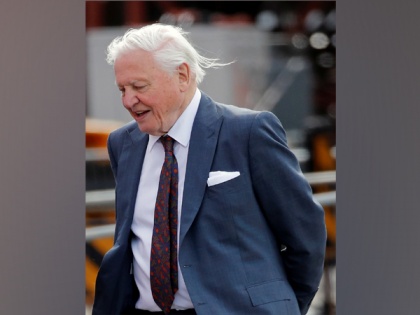Broadcasting can be used to understand how nature operates: Sir David Attenborough in Indira Gandhi Prize acceptance speech
By ANI | Published: September 8, 2020 01:08 AM2020-09-08T01:08:30+5:302020-09-08T01:25:02+5:30
After being conferred with the Indira Gandhi Prize for Peace, Disarmament, and Development for 2019, British broadcaster Sir David Attenborough used his acceptance speech to throw light on how broadcasting can be used to "understand the complexities of the ways in which nature operates."

Broadcasting can be used to understand how nature operates: Sir David Attenborough in Indira Gandhi Prize acceptance speech
After being conferred with the Indira Gandhi Prize for Peace, Disarmament, and Development for 2019, British broadcaster Sir David Attenborough used his acceptance speech to throw light on how broadcasting can be used to "understand the complexities of the ways in which nature operates."
The legendary broadcaster and natural historian began the acceptance speech at the virtual event by talking about the global crisis that the world is currently facing and he went on to share how the crisis has its roots set in the "history of humty."
"Our world today is heading towards a major crisis. It is one unlike any other that humty has faced in all its history. It is not a national crisis--one which a single society can solve by a revolution--whether violent or peaceful," he said.
"It is a global one, one that all nations of the world are now facing together; and it is one which has its roots deep in the history of humty," he added.
The 94-year-old broadcaster then went on to describe how human activities over centuries have been taking over the natural world and how the same is affecting the planet in the face of numerous environmental and natural disasters.
"We have now felled half of the tropical forests in the world. Half the coral reefs, the richest environments in the seas, and the nurseries for many ocec fish are now dead. We have taken over the natural world and are destroying it. Yet we depend upon it for the oxygen we breathe, and for every mouthful of food we eat, whether vegetable or mal," he said.
"Ice-caps are melting. Deserts are spreading. Sea-levels are rising and threatening to drown many coastal cities and the territories of entire island nations may well be lost. We are now putting at risk the continuation of the natural processes on which we ourselves depend for our very lives," the naturalist added.
The well-known broadcaster then highlighted the ways in which these challenges will have to be dealt with in a global manner by all nations.
"We must change our ways and we must do so swiftly and globally. But success will only come if the nations of the world agree to act together, and help one another. This will not be easy. We have to change from being nationalists and become internationalists," he said.
He then used the platform to share how broadcasting can be used to "understand the complexities of the ways in which nature operates."
"The United Nations tells us that the majority of people on the planet are now urbsed. That means that most of us are - to some degree - cut off from the natural world. So, it may not be easy for all of us to understand the complexities of the ways in which nature operates. But broadcasting can help. Television, these days, can take you to every part of the world no matter how remote and can show you how that part of it works," the historian said.
"It can show how and why things can easily go wrong if their workings are not understood. And it can explain how errors can be put right and disasters avoided - if only nations would cease their arguments and work together to find solutions. In short, it can explain how the Earth's problems can be solved if there is understanding and co-operation between nations," he added.
Attenborough ended the speech by sharing an anecdote from one of his meetings with former Indian Prime Minister Indira Gandhi and by stating that he still treasures the memory.
"Fifty-six years ago, when I was a young television producer, a distinguished Indian politician came to visit us to see how this new means of mass communication - television - actually worked. She also asked to see how we operated outside London - and I was given the privilege of escorting her to Birmingham, a hundred twenty miles or so away," the 94-year-old broadcaster said.
"On the long drive through the night, there and back, she told me something of the huge problems of broadcasting to such an immense and varied nation as India, whose citizens speak such a multitude of mutually incomprehensible languages. It was a huge privilege to listen to her. Her name, of course was Mrs Indira Gandhi. I treasure her memory," he added.
Sir David Attenborough was conferred with Indira Gandhi Prize for Peace, Disarmament, and Development for 2019 by former Indian Prime Minister Manmohan Singh during a virtual event that took place on Monday.
Heaping praises on the broadcaster and historian, Singh said that in recent times David Attenborough has become one of the most vocal and effective advocates of environmental protection, raising his voice against the wanton destruction of the natural world in the name of progress and the seemingly insatiable needs of the human race.
( With inputs from ANI )
Disclaimer: This post has been auto-published from an agency feed without any modifications to the text and has not been reviewed by an editor
Open in app